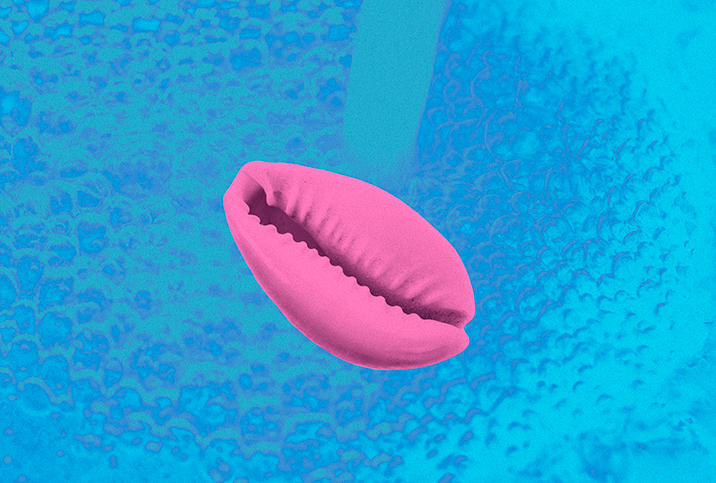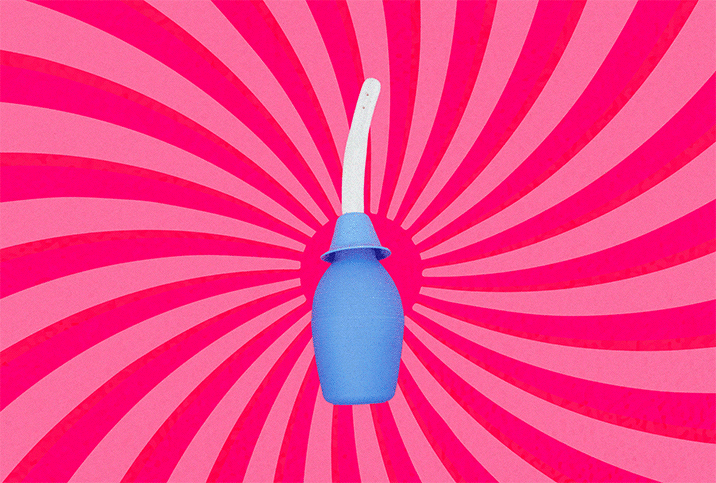Why You Shouldn't 'Spring Clean' Your Vagina

Now that the world is starting to open up again and you might actually invite guests to your home, it’s probably a good idea to clean with a little extra vigor this spring (think: long-overlooked tasks such as beating your rugs, vacuuming under the bed, clearing out the fridge and dusting the crown molding). But what’s good for the nooks and crannies in your home isn’t always good for the nooks and crannies in your body.
Although there are an endless amount of douches, sprays, deodorants, wipes and yes, even blush designed to spruce up your vagina, many of these products aren’t all that great for you.
“It is important to check ingredients on any feminine washes," said Sarah de la Torre, MD, an OB-GYN and chief medical officer at Joylux, which creates products for women facing menopause. Because the vulva—the outer part of the female genitals—is lined with mucous membranes, that tissue is extremely absorptive and can soak up chemicals quickly and without metabolizing them, she explained.
Many products marketed for vaginal hygiene contain parabens, phthalates and artificial fragrances, all of which are endocrine disruptors, chemicals that interfere with the body’s natural production of hormones. The National Institute for Environmental Health Sciences lists metabolic disorders, a weakened immune system and fertility difficulties among many possible adverse effects from endocrine disruptors.
Because the vulva is lined with mucous membranes, that tissue is extremely absorptive and can soak up chemicals quickly and without metabolizing them.
Other preservatives, dyes and fragrances found in washes and wipes are linked to irritation, allergic reactions and asthma, according to research and advocacy group Women's Voices for the Earth. Some are even carcinogenic—substances that can lead to cancer.
Just because something doesn’t have harsh chemicals, though, doesn't mean it’s safe to put in your vagina. Yoni pearls, vaginal suppositories designed to “detox” your vagina and rid it of debris, bacteria and "past sexual partners," are frequently marketed as all-natural botanicals. However, the Mount Sinai Adolescent Health Center states that they can cause toxic shock syndrome and pelvic inflammatory disease.
Even douching with plain old water can be harmful. "It tends to wash out the ‘good guy’ bacteria,” said Mary Jane Minkin, an OB-GYN who serves as a clinical professor of obstetrics and gynecology at Yale University Medical School. “The healthy lactobacilli lead to an acidic environment,” which is a good thing—healthy vaginas' moderate acidity makes them less susceptible (although certainly not immune!) to bacterial vaginosis or STIs.
In some cases, the consequences of douching may be even more serious. A review of research published in The American Journal of Maternal/Child Nursing found possible links to fertility and delivery problems, endometritis and cancer.
The great irony of all of this is that—say it with me, now—THE VAGINA IS SELF-CLEANING. There’s no reason to send anything up in there because it has evolved to maintain the correct pH balance and does a great job of keeping itself clean via natural secretions, de la Torre said.
The great irony of all of this is that the vagina is self-cleaning.
And despite what you may have heard from immature teens on TikTok or bad jokes in movies, there is nothing wrong with the natural scent (or taste, for that matter) of a healthy vagina—a lot of people actually find it to be a turn-on. Seriously funky smells that appear out of the blue do sometimes need to be checked out, but vaginas are always going to have a slight musk. And that’s fine. Vaginas are supposed to smell like vaginas, not peach blossom or white jasmine or island splash or sunset oasis (which are all actual scents of vaginal area washes).
“No vagina is odorless, which is OK," de la Torre added. "They have many possible smells, which may change depending on your diet and menstrual cycle. If the smell is pungent or unpleasant, contact your doctor. Certain conditions, such as bacterial vaginosis, can cause your vagina to have a strong smell. Your doctor can help advise on treatment options."
In general, though, simpler tends to be better when it comes to cleaning down there.
If your vagina is healthy, you probably don't need to do anything to your vulva or vagina other than washing your vulva with water, Minkin said. However, “if you are feeling some irritation or have a bit of an odor—but it's not bad enough that you feel you need to see a medical provider—you certainly can try to help pH-balance your vagina,” Minkin added. Try using over-the-counter gels you can find in your pharmacy or probiotics, "which contain the same type of lactobacilli that are the ‘good guy’ bacteria of the vagina.”
In the end, what your vagina wants isn’t so different from what everyone wants: to be appreciated for what it is and for how it contributes—and to mostly be left alone.


















